Probiotics for Dogs: Because Dogs Get Leaky Gut, Too
 |
Probiotics for dogs are as important to them as probiotics are to you! Find out what the research shows, and which probiotics I recommend. |
My little fur baby, Xena, was adopted in March of 2020. The breeder failed to mention that she was experiencing diarrhea and had been on multiple rounds of parasitic and de-worming medications, as well as one dose of antibiotics. She was being fed a wheat-based dog food by the breeder.
Needless to say, I sprang into action once I experienced her incessant need to eliminate the watery poop. Although it is best to slowly transition a dog off one food to the next, I knew that the wheat-based food had to be stopped immediately if her gut was going to heal. I put her on a gut-healing protocol, and she began to recover. Part of that protocol involved the use of probiotics for dogs. She is doing very well now, growing and being both a joy and terror, as only puppies can be! :)
As I mentioned in my book, Probiotics: How to Use Them to Your Advantage, upset stomach/vomiting and intestinal upset/diarrhea are among the top ten reasons why pets need veterinary attention, and many times antibiotics are prescribed. Antibiotics should be the last resort for our fur babies as they are for us, used only after other options and analyses have been exhausted. Analyses such as fecal tests, blood tests, urine tests, or biopsies, and more conservative treatments such as diet, prebiotics, probiotics for dogs, or anti-inflammatory measures should be undertaken before antibiotic use. Articles in prestigious journals such as the Journal of Small Animal Practice agree.
Antibiotic usage induces a rapid and significant drop in bacterial richness, diversity, and evenness, meaning that it significantly disturbs the dog’s gut microbiota and microbiome. Studies show that both acute and chronic intestinal inflammation in dogs is associated with significant differences in the composition of the intestinal microbiota. Although I am mostly going to comment on dogs in this article, studies show similar problems in cats.
Antibiotics are not the only thing that disrupt a dog or cat’s microbiota and microbiome. Some of the same things that upset yours upset theirs: stress, disrupted sleep, improper food, sensitivities to food and environments, external toxins, etc., including INTERNAL toxins.
Did you know that dogs and cats can get IBD (irritable bowel disease, like colitis)? Did you know that they can get leaky gut? Did you know that many animal skin problems originate in the gut? Did you know that gut problems cause mental problems for them due to the microbiome-gut-brain axis? Those are all true, unfortunately.
A disruption in the gut health of our fur babies can cause more problems than just diarrhea. It can negatively impact their immune status. It also can allow internal toxins, like LPS (lipopolysaccharide) from some gut bacteria, to enter the bloodstream and cause inflammation locally in the GI (gastrointestinal) tract, or in places far away from the GI tract. It can also cause leakage of gut bacteria, undigested food, and other irritants through the GI wall.
Keeping our dogs’ and cats’ gastrointestinal tracts healthy with things like probiotics for dogs and cats, just like we do for ourselves, will enhance their health and lives, and save us money and heartache in the meantime. As a dog lover, I encourage you to consider the health of your furry family member when you make choices for them. You may not be able to control everything in their environment, but you can support their gut health.
What Do Studies Show about Probiotics for Dogs?
I am not citing every study done on gut health or probiotics for dogs because to do so would require writing a small book. Instead, here are some studies that focus on probiotics for dogs:
Acute hemorrhagic diarrhea syndrome (AHDS) is a common reason why dogs are taken to the vet. While the exact causes are not fully understood, there is strong evidence that Clostridium perfringens, a pathogen, and its toxins play a role and are responsible for the intestinal lesions in most dogs diagnosed with the condition. AHDS results in acute onset of hemorrhagic diarrhea, lethargy, dehydration, and anorexia. Due to massive fluid loss, dogs will quickly develop hypovolemia, and this can be life threatening when untreated.
In a 2018 a prospective, placebo-controlled, blinded trial, 25 dogs with AHDS were given the probiotic supplement Visbiome, a mix of eight strains of Lactobacillus, Bifidobacterium, and Streptococcus probiotics for 21 days. The studied outcomes were the clinical course, intestinal microbiome, and toxigenic C. perfringens. Visbiome was dosed according to weight: 225 billion CFU for 1±10 kg dogs; 450 billion CFU for 10±20 kg dogs; 900 billion CFU for 20±40 kg dogs for 21 days on a daily basis.
Clinical signs in the dogs were evaluated daily from day 0 to day 8. Key commensal bacteria, C. perfringens, and enterotoxins were assessed on days 0, 7, and 21. The probiotics group showed a significant clinical recovery on day 3 compared to the same in the placebo group on day 4. The abundance of Blautia and Faecalibacterium, two commensals that are associated with health benefits, was significantly higher in the probiotics group on day 7 compared to day 0, whereas this did not occur in the placebo group.
The abundance of the pathogen C. perfringens was significantly lower on day 7 compared to day 0 in the probiotics group, but not in the placebo group, and enterotoxin genes were significantly lower in the probiotics group on day 21 compared to placebo. The conclusion was that the probiotics for dogs were associated with an accelerated normalization of the intestinal microbiome, and that both groups recovered without the intervention of antibiotics.
In a 2020 study, L acidophilus D2/CSL (CECT 4529) was given to purebred boxers at a dose of approximately 5 billion CFU/kg of food. Nutritional status markers such as body weight, skinfold thickness, and body condition score, as well as fecal quality, were analyzed. Results showed that the probiotic significantly improved both parameters.
In a 2019 small pilot study, 11 dogs with and without gut dysbiosis and diarrhea and vomiting were given a probiotic supplement containing Bacillus subtilis and Pediococcus acidilactici for 30 days. Results indicated that in dogs with gut dysbiosis, GI symptoms were greatly reduced, or disappeared entirely with the probiotics for dogs. Total body inflammation and leaky gut markers were also dramatically reduced. In healthy dogs, there were no adverse effects and flatulence appeared to be reduced.
In another 2019 study, 40 dogs with diarrhea were randomly assigned to probiotic or placebo. Probiotics, containing Lactobacillus casei Zhang, Lactobacillus plantarum P-8, and Bifidobacterium animalis subsp. lactis V9 were fed to 20 treated dogs for 60 days. Fecal analyses from start to finish of the study showed a significantly higher microbial diversity and a marked change in the structure of the gut microbiota in the treatment group.
There was also an increase in the abundance of some beneficial bacteria and a reduction in the abundance of many opportunistic pathogenic bacteria such as Clostridium perfringens in the probiotic-treated dogs. Pathways related to health benefits were upregulated, and pathways and networks related to pathogen virulence and cell signaling were downregulated. Probiotics for dogs substantially improved the canines' health.
In a 2018 prospective, non-randomized, double-blinded, placebo-controlled study, Saccharomyces boulardii was given to four healthy dogs and dogs with chronic enteropathies (CE) for 10 days. Dogs with CE were also given standard treatments, and half received placebo and half received probiotic. No side effects in healthy dogs were seen during the study.
Clinical activity index, stool frequency, stool consistency, and body condition score improved significantly in dogs with CE receiving S. boulardii versus the placebo. The authors of the study concluded that S. boulardii as probiotics for dogs can be safely used in dogs with CE and seems to achieve better control of clinical signs than standard therapy alone.
In a small 2015 study, Bifidobacterium animalis subsp lactis LKM512 was given to five dogs for 14 days. Feces were collected and analyzed on days 0, 7, 14, and 21. The numbers of viable LKM512 present in feces were determined by both culture-based techniques and molecular analysis. On days 7 and 14, the numbers of viable LKM512 that were detected in feces by culture-based techniques and molecular analysis were greater than the original daily dosage, and gene sequences analysis showed that relative proportions of Bifidobacterium species and Bifidobacteriaceae were significantly higher after administration of the probiotic than before. This study showed that LKM512 can survive strong gastric acid, and proliferate in the large intestine of dogs.
In a 2010 randomized, double-blind study, 36 dogs suffering from acute diarrhea with or without vomiting were given probiotics consisting of heat-killed Lactobacillus acidophilus and live strains of Pediococcus acidilactici, Bacillus subtilis, Bacillus licheniformis and Lactobacillus farciminis. The time from initiation of treatment to the last abnormal stools was significantly shorter in the probiotic group compared to the placebo group, although the time to the last vomiting episode was nearly equal. Once again, probiotics for dogs showed substantial benefits.
What Are Recommended Probiotics for Dogs?
Probiotics for dogs that originated in the canine gut have been isolated and characterized, and these include two genera well-known in the human probiotics space, Lactobacillus and Bifidobacterium, as well as a species commonly seen as opportunistic in humans, Enterococcus faecium. You can see from the aforementioned studies that many of the same species of probiotics can be used in both dogs and humans, although at times the strains may differ.
The probiotics for dogs I recommend are those that contain species and/or strains shown in studies to be beneficial. Dogs’ microbiomes are different than human ones, but as the studies discussed above show, common probiotic genera can be beneficial in both canines and humans. Even small doses of fermented vegetables (without the vegetables known to be harmful to dogs such as onions and garlic) may be beneficial for the lactic acid bacteria they contain.
As shown in an aforementioned study, Visbiome was used successfully in dogs. Some websites will tell you to never, ever use probiotics for humans as probiotics for dogs, but that is not true. After all, Visbiome is a human-grade probiotic supplement, and dogs can eat some fermented vegetables for humans that are safe for them. Be sure to follow appropriate dosing and observe the same rules as to when probiotics are contraindicated in humans, and also minimize excipients and allergenic ingredients. Check with your veterinarian if you have any concerns.
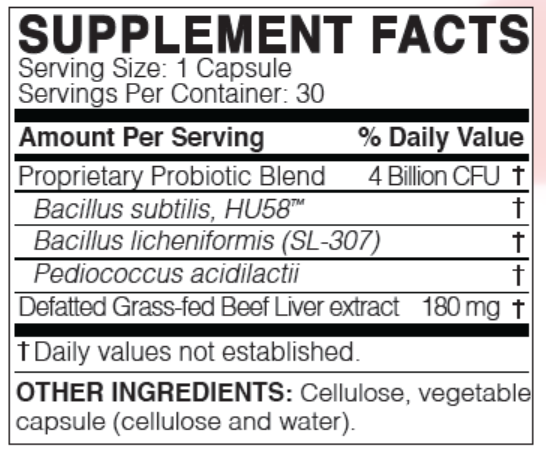 |
A product new to the marketplace in 2020 is FidoSpore™. It is the first probiotic supplement clinically proven to support digestive health and reduce leaky gut in dogs. Bacillus subtilis HU58 and Bacillus licheniformis
(SL-307) are both spore-forming probiotics that produce digestive
enzymes, strengthen the immune system, produce short-chain fatty acids,
and maintain the gut barrier. Pediococcus acidilactii is lactic
acid-producing bacterium that has a wide range of benefits in dogs.
FidoSpore™ also contains defatted grass-fed beef liver extract added for
flavor and aroma. |
Dr. Mercola Complete Probiotics for Cats and Dogs is a powdered
formula dosed by the weight of the dog or cat. Each scoop contains 38
billion CFU from 14 carefully selected strains, including Lactobacillus, Bifidobacterium, Saccharomyces, Streptococcus, Enterococcus, and Bacillus species known to promote optimal gastrointestinal health in petsNote that although the picture of this label still shows Lactobacillus sporogenes as an ingredient, their website correctly lists the microbe as Bacillus coagulans.
The
website says that these strains survive stomach acid to reach their
small intestine. The other ingredients are microcrystalline cellulose
and silicon dioxide. This product is listed as being GMO-free,
gluten-free, and soy-free. It does not require refrigeration, but I
refrigerate mine to extend the viability.
This supplement has
been available for years, and is one I gave to my previous fur babies as
well as to Xena and my grand-doggie. To purchase Dr. Mercola Complete Probiotics for Cats and Dogs, find it in my online Fullscript dispensary, or my online Wellevate.me supplement dispensary, or on the Mercola website.
Purina launched a prescription-only supplement for dogs for anxiety
management based on the knowledge that the gmicrobiome-gut-brain axis
can affect behavior. Calming Care is packaged in once-daily sachets and contains Bifidobacterium longum
BL999. In a blinded, placebo-controlled, crossover study at the Purina
Pet Care Center, investigators evaluated the effects of administering
BL999 to 24 Labrador retrievers who demonstrated anxious behaviors. Dogs
were assessed for both behavioral and physiologic changes during the
15-week study.
According to the news release in American Veterinarian,
90% of the study’s dogs showed improvement in displaying anxious
behaviors such as excessive vocalization, jumping, pacing, and
spinning. Physiologic evidence of decreased anxiety included “reduced
salivary cortisol concentration, decreases in heart rate and increases
in heart rate variability in response to various stimuli.”
It is interesting that Bifidobacterium longum strains are also effective in humans for anxiety. To purchase this supplement, see your veterinarian for a prescription.
Probiotics for dogs and cats are an easy way to improve your fur baby's health!
References:
- https://www.ncbi.nlm.nih.gov/pmc/articles/PMC6971114/
- https://www.ncbi.nlm.nih.gov/pubmed/32179577
- https://www.ncbi.nlm.nih.gov/pubmed/20137007
- https://www.ncbi.nlm.nih.gov/pubmed/26322543
- https://www.ncbi.nlm.nih.gov/pubmed/31021333
- https://www.ncbi.nlm.nih.gov/pubmed/29212912
- https://www.americanveterinarian.com/news/purina-launches-supplement-for-canine-anxiety-management
Return to Health Benefits page.
Return to Homepage.
I research studies and share my clinical experience to write this free site to help you find solutions to your problems. As part of that, I recommend products and services that I genuinely believe will be of help to you. If you click on a link to a product/service, I may receive a small commission to support my efforts if you buy something. The item does not cost you more.
Thanks for visiting this site! If you've enjoyed reading this page or have found the information to be useful to you, please "like", tweet about it, or share it so others can benefit, too. You can leave comments below via Facebook or Disqus.
Comment with Disqus (including as a guest), Twitter or Google accounts:
If you are one of my many readers without a Facebook account, you can still comment.
Disclaimer: Please note: By law, I cannot provide any personalized recommendations for your specific health concern on this site. The information contained in this site is educational in nature and is not intended as diagnosis, treatment, prescription or cure for any physical or mental disease, nor is it intended as a substitute for regular medical care. Consult with your doctor regarding any health or medical concerns you may have.
Subscribe to my monthly newsletter and receive a free copy of "How to Use Probiotics to Lose Weight and Be Healthier".

To comply with the EU's GDPR data privacy regulation, please subscribe here:
Looking for some quality professional supplements, including probiotics? Check out my online dispensary, as I will be doing reviews of some of these products in the future. Click on the Fullscript picture. (Note: If you were a former Wellevate customer, please switch to Fullscript for a better customer experience. Thanks!)
Some competitors of SBI (Solo Build It) are posting fake negative reviews of SBI. If you are considering creating your own website business, or if you have a brick-and-mortar business but want an online presence, I highly recommend SBI!


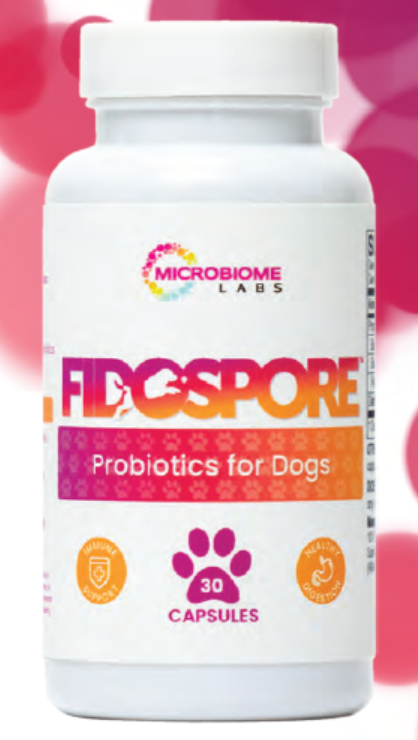
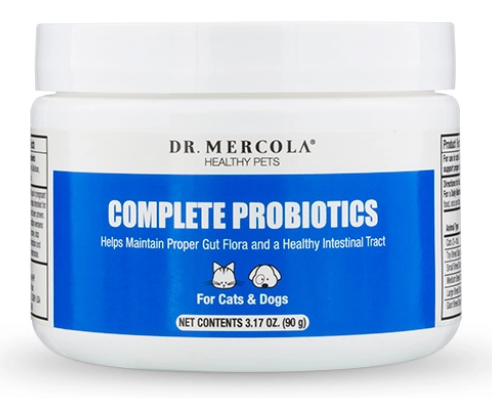
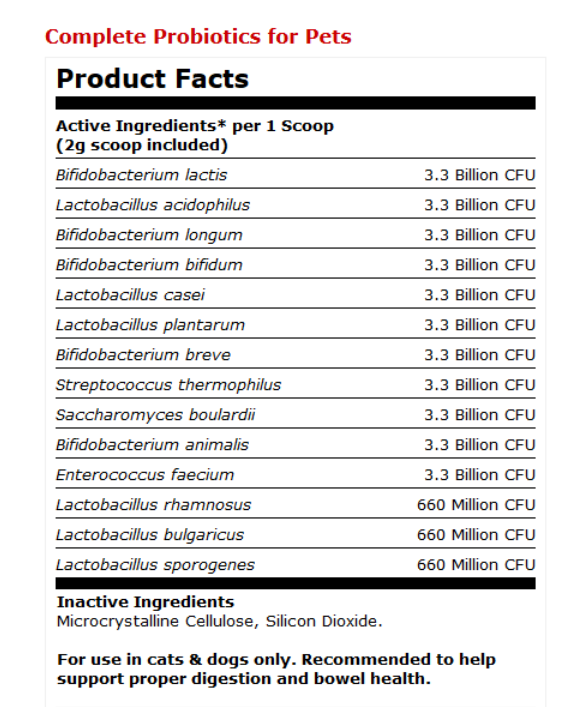

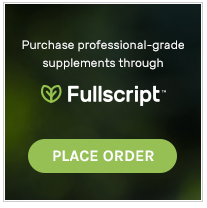

Comment with Facebook!
I'd love to hear your opinion about what you just read. Leave me a comment in the box below! Other commenting options follow the Facebook comments.